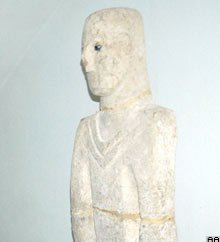
Herodotos in Book II of The History tells us of Pharaoh Psamtik I and the alleged "first" language experiment.
Now the Egyptians, before the reign of their king Psammetichus, believed themselves to be the most ancient of mankind. Since Psammetichus, however, made an attempt to discover who were actually the primitive race, they have been of opinion that while they surpass all other nations, the Phrygians surpass them in antiquity. This king, finding it impossible to make out by dint of inquiry what men were the most ancient, contrived the following method of discovery:- He took two children of the common sort, and gave them over to a herdsman to bring up at his folds, strictly charging him to let no one utter a word in their presence, but to keep them in a sequestered cottage, and from time to time introduce goats to their apartment, see that they got their fill of milk, and in all other respects look after them. His object herein was to know, after the indistinct babblings of infancy were over, what word they would first articulate. It happened as he had anticipated. The herdsman obeyed his orders for two years, and at the end of that time, on his one day opening the door of their room and going in, the children both ran up to him with outstretched arms, and distinctly said "Becos." When this first happened the herdsman took no notice; but afterwards when he observed, on coming often to see after them, that the word was constantly in their mouths, he informed his lord, and by his command brought the children into his presence. Psammetichus then himself heard them say the word, upon which he proceeded to make inquiry what people there was who called anything "becos," and hereupon he learnt that "becos" was the Phrygian name for bread. In consideration of this circumstance the Egyptians yielded their claims, and admitted the greater antiquity of the Phrygians.And archaeology confirms the results of this experiment.
That these were the real facts I learnt at Memphis from the priests of Vulcan. The Greeks, among other foolish tales, relate that Psammetichus had the children brought up by women whose tongues he had previously cut out; but the priests said their bringing up was such as I have stated above. I got much other information also from conversation with these priests while I was at Memphis, and I even went to Heliopolis and to Thebes, expressly to try whether the priests of those places would agree in their accounts with the priests at Memphis. The Heliopolitans have the reputation of being the best skilled in history of all the Egyptians. What they told me concerning their religion it is not my intention to repeat, except the names of their deities, which I believe all men know equally.
Menemencioglu, K., The Sabians of Harran, 2007
When we mention Anatolian civilizations very few of us think of Harran. The city of Harran is virtually a forgotten spot in the geography of Anatolia. Whereas in reality, it is a place of great importance having a very significant role in the development of civilization. It may surprise you to know that a 11,500-year-old temple was discovered in Göbeklitepe, and a 13,500-year-old statue, the world’s oldest, was discovered during an excavation in Balıklıgöl. Assistant Professor A. Cihat Kürkçüoglu of Harran University claims that the history of civilization began in the Urfa (a city just 45 kilometers from Harran). When we consider that civilization began in Egypt in Mesopotamia roughly 5,000 years ago we can have an idea on how these archeological finds have rocked the foundations of our understanding of history.
I think they are meaning civilization more than race.
ReplyDeleteIf that's the case... I stand corrected.
ReplyDeleteAnd yeah... homo habilis is not homo sapiems. They'd win that argument...But then, I'd be arguing that, too.
As far as oldest civilization goes... I think the Sumerian folks have them beat by a great stretch of time, at least 14 centuries. And, as you suggest, there were great cultures predating that one.
The Ubaid period in Sumer starts in the late 6th millennium and it's pretty much a blank before that except for Phrygia and Atlantis/Antarctica.
ReplyDeleteAtlantis/Antarctica
ReplyDeleteThere you go again.
There I go again with that pesky history thing.
ReplyDeleteWhat of the Maha Bharata?
ReplyDeleteDoes it not describe an atomic war? Atlantean technology?
Jeffrey, what is a race?
You refer to what scientists describe as a species. A speculation on their part of course, masquerading as scientific proof of evolution. The Phrygians came from Asia Greater, rather than minor?
The Temple complex is alleged to have been filled in by human effort. Buried.
ReplyDeleteThe timing, if accurate, fits in with the expulsion from Eden, if we time it from the diamond laden destruction over North America.
Very interesting and it clearly predates the Egyptians an probably the Phrygians.
Fungus,
ReplyDelete"The Phrygians came from Asia Greater, rather than minor?"
According to Herodotos, Phrygians came to Asia Minor from Thrace (Europe).